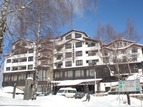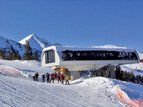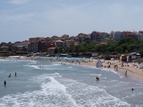Bulgarian Summer 2004 Tourist Season
Capital Weekly, 21.08.2004
For the first time this year we witnessed a decrease in the number of German tourists who, for the past decade had been dominating the Bulgarian Black sea resorts. Tourism experts explain the phenomenon above all with a stagnation of the German economy, the worst ever for the past 10 years, which affected chiefly the families with children. And last but not least, we should mention that the Germans were the first "to carry" home their impressions of the construction euphoria at the start of the tourist season at Zlatni Pyasatsi and to a lesser extent at Slanchev Bryag. That the destination may have become too boring for them is not to be ruled out. According to experts' estimates the so called German market has reached the summit of its development in Bulgaria. "The German market registered a growth in 2004 too. However, the boom was last year. In tourism there is always a cyclicity of four to five years of a boom, followed by a drop," Hristo Kolev, representative of the German tour operator Thomas Cook for Bulgaria said. Recession in Germany is a fact and it hit Bulgarian tourism, but had a healing effect and a happy end. Welcome to the British Tourists For the first seven months of 2004 the number of UK tourists marked a 67.6 pct rise compared to the same period of 2003 and already come third in terms of number after Greeks and Germans. It is a compliment to this country because it means that there are already hotels which meet the specific and rather high sanitary and safety requirements of the UK tour operators. Despite the fact that the so called new generation hotels do not suffice. Officials from World of TUI claim they cannot meet the big demand for Bulgaria in Britain due to the lack of bed contingents to comply with the high requirements. This is the reason why their British tour operator Thomson will bring 15,000 instead of the planned 25,000 tourists to Bulgaria. TUI Nordic expects to end the year by around 60,000 tourists, up 50 pct year-on-year. The number of UK tourists is expected to double in 2005, while that of the Scandinavian tourists - to mark an at least 20 pct increase year-on-year. Or, to put it in a nutshell, Bulgaria is referred to as a hit in the UK, and not only as a tourist destination, but as a place to buy a cheap real estate. For the time being the Ministry of Economy does not see any particular connection between the British who come to the country to buy a real estate, and the people arriving as tourists. Against the background of the 2.2 million foreign tourists, of whom British were 150,000 for the first nine months of 2004, the buyers of houses have but an insignificant share. But in future maybe they will favourably impact tourism, since they will be the live advertisement of Bulgaria, they will spend their money here and will probably invite British guests. Hoteliers are particularly optimistic about the growing traffic from the Czech Republic, Slovakia, Poland, Hungary, and Slovenia. The tourists from the former socialist countries re-discover the southern Black Sea resorts - Nessebar and Sozopol, young people prefer Slanchev Bryag, the families stay at Albena. The middle-aged generation comes back to the familiar places out of nostalgia, the young - out of curiosity. Besides, the new EU members prefer Bulgaria for economic reasons - the prices are low for their standard of living and it is cheaper than the resorts in the euro zone. The "Old" Operators' New Mission The activity of the well known German tour operators is an obstacle in the way of the "internationalisation" (if at all) of tourism along the Black Sea coast. TUI, Neckerman and ITS are already international concerns, operating in almost all European states. Tourists from some 22 destinations arrive in Bulgaria by TUI. As of next year Poles will come also by Thomas Cook-Poland. So, Bulgarian tourism continues being dependent not on the German tourists, but on the "German" tour operators. So, fears should be connected with their financial health rather, than with the state of the German economy. As is known, it were the German tour operators to provide the credits for the initial upturn in Bulgarian tourism. They assumed the function of its advertising agents in return for a percentage from hoteliers' turnover. However, the three to five year contracts for pre-paid services in the form of which the credits come, are already expiring. This trend is expected to decline and hoteliers will ever more rely on banks because there emerge new tourist destinations, like Croatia, and German operators will not be this interested in working for Bulgaria's cause. And where foreigners did not suffice, hoteliers had provided "Last Minute" Offers to Bulgarians Albena, which traditionally offers discounts to Bulgarians, came out with the record low 38 Bulgarian levs all inclusive price per capita daily in a three-star plus hotel. The aim is to achieve the maximum occupancy rate of hotels, the commercial director, Margita Todorova, said. However, the problem is that few Bulgarians, some 350,000, can afford such a vacation with their families. Other resorts followed suit and started offering discount holiday packages. This season, we have been witnessing a very positive trend of Bulgarians having their vacation in this country, Deputy Economy Minister, Dimitar Hadzhinikolov, said. Something more, the tour operators working with the Black Sea resorts are already inclined to count on the home market next year too. The leading companies print special leaflets for Bulgarians, offer discounts for early bookings, consider the contracting of big bed contingents for Bulgarians. There is a large niche in this respect, all the more so that in the wealthy countries the ratio of the revenue from tourism is 70:30 pct in favour of the domestic market. The South Is Preferred to the North The reason why foreign tourists preferred last July the southern Black Sea resorts to the northern Albena, Saint Elias, and Zlatni Pyasatsi is unclear. The interest in Slanchev Bryag, Zlatni Pyasatsi, and more particularly Albena has been on the decline at the expense of the hotel products outside them, TUI representative for Bulgaria, Valentin Yossifov, commented. Despite the hectic construction, hotels almost do not differ from one another and they cover only a definite segment of the tourist demand. Just the opposite, the new hotel compounds, mushrooming along the southern Black Sea coast are more attractive to the new customers and register a good occupancy rate. Airport statistics show that Bourgas airport is almost catching up, in terms of tourists handled, the Varna airport which has also marked a growth. It is a well known fact that this year Bourgas airport is handling more tourists of the leading tour operator - World of TUI, than Varna airport. The operator said it had a larger bed cobntingent along the southern Black Sea coast. Hotels Outnumber Tourists The number of hotel beds has been increasing. The latest information is that the bed contingent increased by 30 pct for the past few years, and 50 big new hotels appeared in 2004. European tourist market is no longer a market of the seller, but of the buyer who dictates the terms. Supply exceeds demand, and the chance of Bulgarian tourism is in quality. Blagoi Ragin from the Bulgarian Hotels and Restaurants Association (BHRA) is optimistic about the development of tourism and advises the owner of two hotels to invest in their renovation instead of starting the construction of a third one. Contracting the 2005 Summer Season between the hoteliers and tour operators ended. Despite the turbulent negotiations the conclusions are that interest in Bulgaria as a destination has been preserved. The current price level will be preserved next year too, with the commitment of hoteliers to improve the quality, Donka Sokolova from the Managing Board of the Bulgarian Association of Tourist Agencies summed up. Which means that despite all the investment activity, the country remains in the low budget column. see source
 Member of:
Member of:



























 Touroperator
Touroperator
